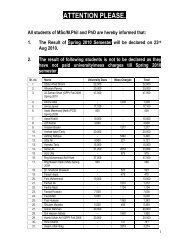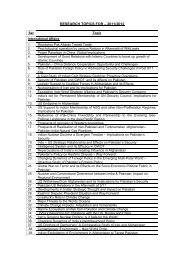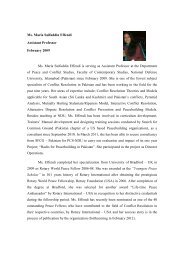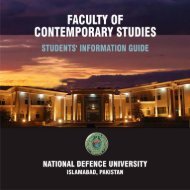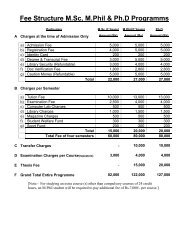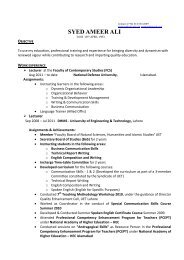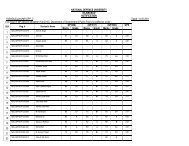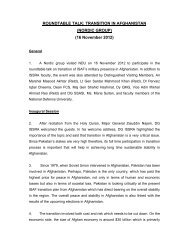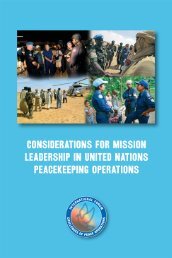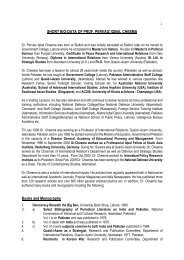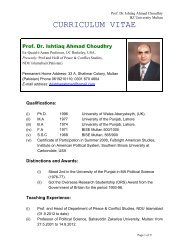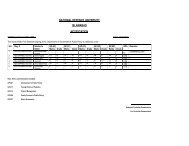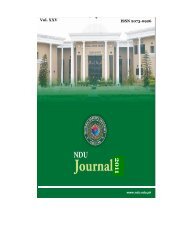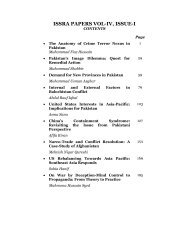OPINION Vol.1, No.1 June 2013 - National Defence University
OPINION Vol.1, No.1 June 2013 - National Defence University
OPINION Vol.1, No.1 June 2013 - National Defence University
You also want an ePaper? Increase the reach of your titles
YUMPU automatically turns print PDFs into web optimized ePapers that Google loves.
Conclusion<br />
of other hostile elements went about scot-free in our country. Pakistan should not permit<br />
unabated movement of such undesirable elements on its soil.<br />
Paradox of Diaspora and Brain-Drain. This is a paradoxical phenomenon. While we would<br />
like our effective Diaspora to contribute meaningfully to our economy, we are also weary of the<br />
brain-drain which is swiftly dwindling away our grey-matter. This needs to be carefully worked<br />
out. It is suggested that we should not be overly concerned about the latter i.e. brain-drain.<br />
Pakistan needs educated and accomplished people to represent it at the international forums who<br />
can contribute invaluably towards professing the view-point of Pakistan.<br />
The research has made an effort to bring to fore various challenges and opportunities which<br />
globalization poses for Pakistan today. Pakistan will have to adjust itself to all the frontiers and<br />
dimensions of the globalization, through macro-economic stability, FDI, communication technology,<br />
raising of remittances, good governance, human resource development and trade promotion through<br />
vibrant FTAs and PTAs. It can safely be concluded that globalization is an irreversible phenomenon<br />
which has come here to stay and Pakistan has to accordingly adjust.<br />
Researcher:<br />
Supervisor:<br />
Mr Zia-ul-Haq, Lt Col Aqeel, Lt Col Majid and Col Akinjobi (Nigeria)<br />
Air Cdre Zia-ul-Haque Shamsi<br />
Endnotes<br />
1 “Globalization,” Merriam Webster, accessed on October 17, 2012, http://www.merriam-webster.com/dictionary/<br />
globalization<br />
2 “Meeting the Challenges of Globalization in the Advanced Economies,” International Monetary Fund, 45,<br />
accessed on October 17, 2012, http://www.imf.org/external/pubs/weomay/chapter3.pdf.<br />
3 “Quotes from yesterday and today,” Wintersonnenwende.com, accessed on October 20, 2012,<br />
http://www.wintersonnenwende.com/scriptorium/english/archives/quotations/quotations01.html.<br />
4 “Globalization,” United Nations, accessed on October 20, 2012,<br />
http://www.unesco.org/education/tlsf/mods/theme_c/mod18.html.<br />
5 Ibid.<br />
6 Ibid.<br />
7 Madam He Luli, “Globalization: Opportunities and Risks for Developing Countries,” <strong>National</strong> Development and<br />
Security Journal 8, no. 31 (2000): 3.<br />
8 United Nations, “Globalization,”<br />
9 T R.F.M. Lubbershe, “Globalization of Economy and Society,” angilefire.com, accessed on November 1, 2012,<br />
http://www.angelfire.com/ia/infovault/globalize.html.<br />
10 Luli, “Globalization: Opportunities and Risks for Developing Countries,” 3.<br />
11 John Baylis, Steve Smith, and Patrica Owens, The Globalization of World Politics: An Introduction to<br />
International Relations (New York: Oxford <strong>University</strong> Press, 2011), 253.<br />
12 Ibid., 90.<br />
13 Ibid., 102.<br />
14 MakamlaMnungu, “Development Studies/International Relations,” (Phd Dissertation, Atlantic International<br />
<strong>University</strong>), 14-20.<br />
15 Ibid., 2030.<br />
16 “Trade,” Justworld.com, accessed on October 15, 2012, http://www.just1world.org/trade.htm.<br />
17 Leslie Hamilton and Philip Webster, The International Business Environment-First edition (New York: Oxford<br />
<strong>University</strong> Press, 2009), 10, accessed on October 16, 2012,<br />
http://www.oup.com/uk/orc/bin/9780199213993/hamilton&webster_ch01.pdf<br />
18 Ibid., 11.<br />
19 United Nations, “Globalization,”<br />
20 Yvette Reisinger and FedericDimanche, International Tourism, Cultures and Behaviour (Elsevier, 2009), 5.<br />
21 MuzafferErcanYllmaz, “The New World Order: An Outline of the Post-Cold War Era,” Alternatives: Turkish<br />
Journal of International Relations 7, no. 4 (2008): 55.<br />
22 Baylis, Smith and Owens, The Globalization of World Politics: An Introduction to International Relations, 450.<br />
23 Yilmaz, “The New World Order: An Outline of the Post-Cold War Era,” 55.<br />
24 Ibid.<br />
25 Ibid., 56.<br />
26 BarankoMilanovic, “Invocme Convergence during the disintegration of the world economy, 1919-39,” Volume 1,<br />
World Bank, 2003, accessed on October 20, 2012,<br />
<strong>OPINION</strong> <strong>Vol.1</strong> <strong>No.1</strong> 77 <strong>June</strong> <strong>2013</strong>



